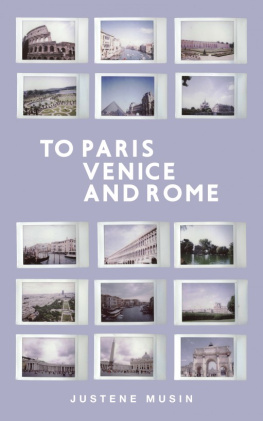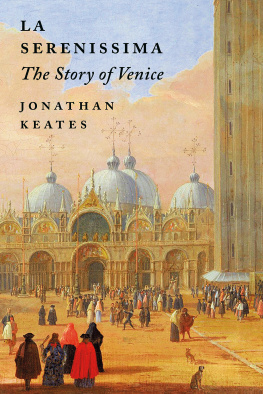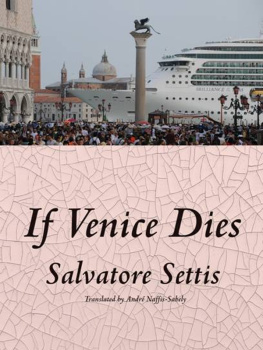ALSO BY MARLENA DE BLASI
Regional Foods of Northern Italy
Regional Foods of Southern Italy
A Thousand Days in Venice
AN UNEXPECTED ROMANCE
by Marlena de Blasi
Algonquin Books of Chapel Hill
FOR
WALTON AMOSS BABY GIRL, VIRGINIA ANDERSON AMOS,
WHO GREW UP TO BE A BEAUTIFUL WOMAN FULL OF GODS
GRACE AND LOVE WHOM I AM HONORED TO CALL
MY DARLING FRIEND
AND
FOR C. D., LISA, AND ERICH,
MY FIRST AND FOREVER LOVES
AND
FOR THE BLUEBERRY-EYED VENETIAN WHO WAITED
Prologue
VENICE, 1989
I sit in my seat long after the train swooshes into its berth at Santa Lucia. I paint a fresh coat of ruby red on my lips, pull a blue felt cloche down to my eyebrows and try to smooth my skirt. I think for a moment of the tale Id told the taxi driver in Rome earlier that morning. Hed asked, Ma dove vai in questo giorno cos splendido? But where are you going on this splendid day?
I have a rendezvous in Venice, Id said slyly, knowing the image would please him.
Watching as Id pulled my fat, black suitcase with its one crumpled wheel backward into the curve of the station doors, hed blown me a kiss and yelled, Porta un mio abbraccio a la bella Venezia. Carry an embrace from me to beautiful Venice.
Even a Roman taxi driver is in love with Venice! Everyones in love with her. Everyone except me. Ive never been to Venice, having always been indifferent about wandering through all those iridescent torpors of hers. Still perhaps what Id told the taxi driver is true. I am behaving curiously like a woman on her way to a rendezvous. Now that Im finally here, though, I wish I could spurn the Old Woman of Byzantium once again.
Exiting the now empty train, I tug my suitcase down onto the platform, giving its evil wheel a kick for encouragement, and stride through the tumult of the station, amidst vendors peddling water taxis and hotels, travelers in the anguishes of arrival and departure. The doors are open and I step out into wet rosy light, onto a sweep of wide shallow steps. Shimmering water glints from the canal below. I dont know where to put my eyes. The Venice of myth is real, rolled out before me. In straw hats and striped shirts, the gondolieri are sculptures of themselves fixed on the sterns of glossy black boats under a round yellow sun. The Bridge of the Barefoot is off to the left and the sweet faade of the church of San Simeone Piccolo hails from across the water. All of Venice is tattered, resewn, achingly lovely, and like an enchantress, she disarms me, makes off with the very breath of me.
I wait for the vaporetto, the water bus, line number 1, and embark on a boat that moves, pian, piano up the canal, stopping fourteen times between the station and San Zaccaria near the Piazza San Marco. I stow my bag in the great heap of luggage on the deck and make my way out onto the prow, hoping to stay outdoors. The benches are occupied, except a few inches where a Japanese womans purse sits. I smile, she moves her Fendi, and I ride amid crisp winds up the astonishing highway. Strange now to think that this boat was to become my habitual transport, this water my daily route from home to buy lettuces, to find a wedding dress, to go to the dentist, to light a candle in a thousand-year-old church.
Along the riva totter the palaces, fragile Byzantine and Gothic faces, the Renaissance, the baroque all in a melancholic row, each one leaning fast against the next. The better to stifle secrets I think. As we approach the Ponte di Rialto, the exit nearest my hotel, I am not ready to leave the boat. I stay on through to San Zaccaria and walk off the landing stage toward the campanile, the bell tower. I wait for a moment, listening for the clanging of la Marangona, the most ancient of San Marcos bells, the one whose solemn basso has signaled the beginning and the end of the Venetian artisans workday for fifteen centuries. Once it warned of enemy approach, saluted a visiting king, and announced the death of a doge. Some say it rings by its own will, that if one arrives in Venice to its great, noble clanging, it is proof of ones Venetian soul, proof the old bell remembers one from some other time. When a friend first told me this story years ago, I asked him how, if six hundred people were passing by at any given moment, anyone would know for whom the bell was ringing. Dont worry, he said. It will never ring for you.
La Marangona is, indeed, silent as I stand before the tower. I dont look at the basilica sitting there behind my shoulders. I dont walk the few meters into the grand piazza. Im not ready. Not ready for what? I tell myself its only that one cant wander into what is touted as the earths most divine drawing room, bedraggled, shackled by a rickety suitcase. I turn back, take the next boat going toward the station, and debark at Rialto. Why is my heart flailing against my chest? Even as I am now drawn to Venice, so am I suspicious of her.
Signora, the Telephone Is for You
The small room is filled with German tourists, a few English, and a table or two of locals. Its November 6, 1993, and I arrived in Venice that morning, two friends in tow. We speak quietly together, sipping Amarone. Time passes and the room empties, but I notice that one table, the one farthest away from us, remains occupied. I feel the gentle, noninvasive stare of one of the four men who sit there. I turn my shoulders in, toward my wine, never really looking at the man. Soon the gentlemen go off, and we three are alone in the place. A few minutes pass before a waiter comes by to say there is a telephone call for me. We have yet to announce our arrival to friends, and even if someone knew we were in Venice, they couldnt possibly know we were lunching at Vino Vino. I tell the waiter hes mistaken. No, signora. Il telefono per Lei, he insists.
Pronto, I say into the old, orange wall telephone that smells of smoke and mens cologne.
Pronto. Is it possible for you to meet me tomorrow at the same time? Its very important for me, says a deep, deliberate, Italian voice Id never heard before.
In the short silence that follows it somehow clicks that he is one of the men whod left the restaurant just moments before. Though Ive understood fairly well what he has said, I cant respond in Italian. I mumble some linguistic fusion like, No, grazie. I dont even know who you are, thinking that I really like his voice.
The next day we decide to return to Vino Vino because of its convenience to our hotel. I dont think about the man with the beautiful voice. But hes there, and this time hes without his colleagues and looking more than a little like Peter Sellers. We smile. I go off to sit with my friends, and he, seeming not quite to know how to approach us, turns and goes out the door. A few beats pass before the same waiter, now feeling a part of something quite grand, comes to me, eyes direct: Signora, il telefono per Lei. There ensues a repeat of yesterdays scene.
I go to the phone, and the beautiful voice speaks in very studied English, perhaps thinking it was his language I hadnt understood the day before: Is it possible for you to meet me tomorrow, alone?
I dont think so, I fumble, I think Im going to Naples.
Oh, is all the beautiful voice can say.
Im sorry, I say and hang up the phone.
We dont go to Naples the next day or the day after, but we do go to the same place for lunch, and Peter Sellers is always there. We never speak a word face to face. He always telephones. And I always tell him I cant meet him. On the fifth daya Fridayour last full day in Venice, my friends and I spend the morning at Florian mapping the rest of our journey, drinking Prosecco and cups of bitter, thick chocolate lit with Grand Marnier. We decide not to have lunch but to save our appetites for a farewell dinner at Harrys Bar. Walking back to the hotel, we pass by Vino Vino, and there is Peter Sellers, his nose pressed against the window. A lost child. We stop in the
Next page





